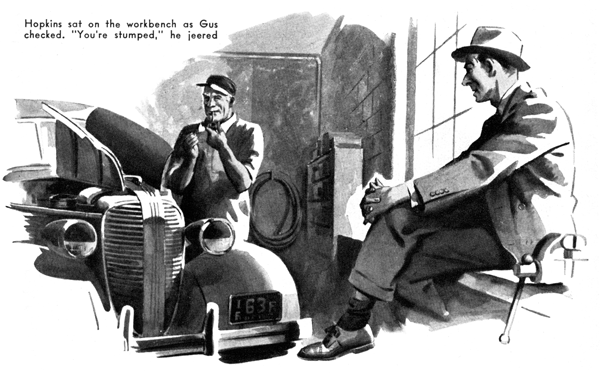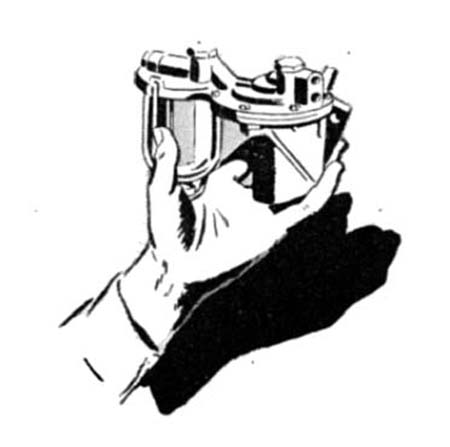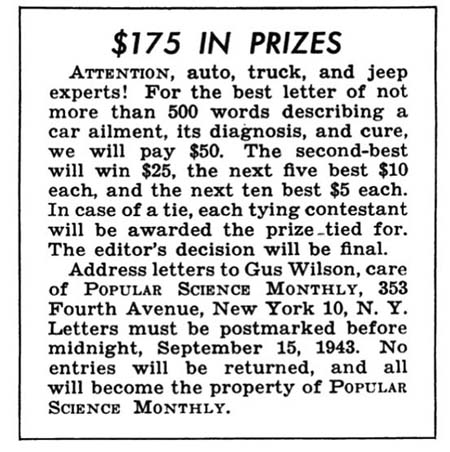September 1943
GUS
MEETS DOUBLE TROUBLE
by Martin Bunn
Repairs Can Be Costly In More Ways
Especially
If They Are Bungled .

Joe Kent, a Model Garage old-timer who now lives in New Jersey, snapped his fingers impatiently.
"I can't understand it!" he exclaimed. "When my repair man over home said that this fuel pump had gone haywire, I wouldn't believe him. That's why I took a chance on getting stalled on the road to get my car over here to you, Gus. This is the third fuel pump that's gone bad on me this year. And I've driven only six thousand miles. Why, I used to drive three times that much before the war, and I can't remember ever having fuel-pump trouble. What's the answer?"
Gus Wilson looked up from the fuel pump he had taken off Kent's car and disassembled on his workbench. "I don't know all the answer yet, Joe," he said. "But I do know that your pump won't work right because some of its parts are corroded. Right now there's moisture on them. Feel for yourself -- right here."
Kent ran a finger over the place Gus indicated. "It's wet, all right," he agreed. "But where the heck did the water come from?"
"I've checked on that," Gus told him. "The crankcase is the only place it could have come from."
"Huh?" Joe retorted doubtfully. "Be yourself, Gus. How could water get into the crankcase and then out of the crankcase into the fuel pump?"
"It wasn't water when it came out of the crankcase," Gus said. "It was moisture in the form of vapor, and it condensed into water . . . Know anything about crankcase ventilation, Joe?"
"Sure I do!" Joe asserted. "It's -- it's -- Oh, you know -- it sort of ventilates the --"
Gus laughed. "Stop stalling," he said. "Crankcase ventilation is just a couple of words to you, same as it is to ninety-nine car owners out of a hundred. It's one of the most important features of modern engine design, but somehow most owners can't appreciate its importance. There are several systems, but they all have the same object -- to force gas vapors out of the crankcase before they have a chance to condense and dilute the engine oil and do other damage. I'm going to do some checking on your car. If you watch, you'll find out why those three fuel pumps went bad after only a couple of thousand miles."
Gus examined the air cleaner on the carburetor of Kent's car and found it in A-1 condition. Then he examined the filter in the crankcase oil-filler cap. It was hopelessly clogged -- and to make it even worse someone had installed the cap with its opening faced toward the back end of the car instead of toward the front end.
"That filter is the cause of all your grief," he told Kent. "When it's clogged up, no air can get through the oil filler pipe. That means that the only ventilation the engine gets is though the outlet pipe. And, of course, putting that cap on wrong-side-to didn't help any. These filters must be kept clean so they'll let the air-flow freely through the crankcase and carry off the vapors. That keeps the oil from becoming diluted.
"Keeping them clean is especially important now," Gus went on thoughtfully, "because people don't use their cars so often since gas rationing, and only take short trips when they do. Consequence is, the engine seldom has a chance to get warmed up thoroughly and pass off the vapors in the exhaust. Few owners understand this wartime handicap, and a lot of them are having troubles like yours. And it's a real headache to the service garages . . . Well, I'll have to clean out that clogged filter. Then I'll install a rebuilt fuel pump for you."
"O.K., Gus," Kent said. "And when I get back home I'm going to give that repair man of mine a good lecture on crankcase ventilation!"
"You do that, Joe," Gus laughed. "Now that you know what it's all about yourself."
Not long after Kent had gone on his way, Vernon Hopkins drove his car into the shop.
Most folks in our town think that Vern is a hopeless sourball, but Gus always stands up for him.
"Give me a chance to check a man's car," he says when someone starts panning Vern, "and I'll tell you all you need to know about his character. Vern may be a grouch, but anyone who keeps a five-year-old bus running as smoothly as his, certainly must have some good in him. There's nothing really wrong with Vern Hopkins. His car proves it."
Feeling that way, Gus greeted Hopkins with a friendly, "Hello, there."
Vern had a scowl on his thin face and he didn't bother to wipe it off when he returned Gus's cheery greeting with a grunt.
"I want you to look at my motor," he grumbled. "Every once in a while it skips three cylinders, and I can't find out why. It's got me worried." He got out, leaving the engine running. "It's doing it now. Hear that?"
Gus nodded. His trained ear told him that there were only three cylinders firing. Knowing how careful and smart Vern is about car upkeep, he felt that he probably had a tough trouble-shooting job ahead of him.
Hopkins hunched his bony frame on the end of the workbench and watched silently and with a scowl as Gus began checking.
While the engine turned over slowly, hitting on only half of its six cylinders, the proprietor of the Model Garage detached a wire from a spark plug and held its end quarter of an inch from the plug shell. He got a good spark. The next two plugs he tested also gave good sparks. As he reconnected the wire to the third plug he looked surprised. All the cylinders were firing now. But just to be on the safe side, he checked the three remaining plugs. Like the three checked first, they all gave good sparks.
He grinned at Vern. "As soon as a good man goes to work on your engine," he said, "the trouble vanishes. It's hitting on all six now."
"I can hear that," snapped Vern. "That's the way it's been acting for several days. Sometimes it runs all right, and sometimes it don't. Why?" he demanded, pointing his long thin finger at Gus. "That's what I want to know -- why?"
Gus picked up his pipe from the workbench and felt in his overalls pocket for his tin of "Delight"; then remembered that he had left it in the office. He went to get it. When he came back a half minute later, Vern jerked a thumb at his car. "What'd I tell you?" he growled. "It's missing again."
"So it is," Gus agreed placidly. "Well, that'll make it a lot easier to locate the trouble."
After switching off the engine, Gus made a quick but careful check that failed to reveal any loose connections. A test of the battery disclosed that it was putting out an adequate amount of current. No cracks showed in the distributor cap. When he pulled the spark-plug cables out of the cap sockets, he found both the terminals and the sockets clean and uncorroded.
Gus's pipe had gone out. As he relighted it, he did a little hard thinking. Vern's tight lips twisted into a sneer. "You're stumped," he gloated.
Gus grinned at him. "Close to it, but not quite," he said. "Any number of things can make an engine miss that haven't got anything to do with the ignition. Carburetor trouble for example."
But when he checked the carburetor, he found that it was delivering a satisfactory mixture to the cylinders. His tester told him that the compression of each of the cylinders was good. He could find no leaks in the manifold.
"That puts me right back where I started from," he admitted. "It must be ignition-circuit trouble. Can't be anything else. I'll take a look at the coil."
"You needn't," Vern told him. "I put in a new coil as soon as she began to miss, and it didn't do a bit of good." He was looking almost happy. "Now you are stumped!" he jeered.
Gus almost lost his temper, but not quite.
"The jinx must be in your distributor," he said. "Let's have a look at it."
"Huh?" Vern grunted. He got red in the face. "There's nothing the matter with that. Why, I -- oh, well, go ahead and look at it."
Gus took off the distributor cap. The rotor was in good condition. He lifted it off and looked at the points. "You been doing any monkeying with this?" he demanded of Bern. "These points look new, and so does the breaker lever."
"They're new," Vern admitted. "What of it?"
"If you'd told me that half an hour ago you'd have saved me a lot of time -- and what it'll cost you to pay for that time," Gus told him disgustedly. "You certainly made a bum job of installing that breaker lever. Here. See that grit? That's what's been making your engine miss."
"Grit? Well, all right. So there is a little grit," Vern Hopkins mumbled grudgingly. "But that little bit wouldn't make the whole engine miss," he asserted belligerently.
"Oh, wouldn't it?" Gus retorted. "The bushing on that breaker lever fits tight enough as it is -- because it's new. Now you try to wedge it to the pivot post even tighter by getting dirt between them. How do you suppose it can move to make the contact to close the primary circuit? Sure, it'll work sometimes, but when it doesn't, there's no current going to the ignition coil and no spark in the cylinder. Result is, the cylinder misses fire. Catch on?" Gus grinned mischievously.
"No," Vern returned flatly. "Besides I don't believe it anyway."
Gus laughed out loud.
"Well," he said, "maybe you'll believe me when you see your headaches go away with this grit."
He cleaned the grit from the lever bushing and from the pivot post. Then he replaced the distributor cap.
"Try it now," he invited.
Vern got into the car, stepped on the starter, and the motor purred without even the slightest hint of a miss.
"Send me a bill," he grumbled ungraciously. "And see that you don't charge me too much."
"Don't worry about that," replied Gus.
"I'll even throw in a bit of free advice. Next time you work on your car, don't be so sloppy. Why, I'd fire a mechanic for being half that careless -- even though mechanics are hard to get."
He ambled over his workbench and picked up a hammer. "Some people will just never learn . . . " he muttered, but the rest of his words were drowned in the roar of the exhaust from Vern's departing car.
"If you're going to be your own mechanic, be a good one," Gus mused. "Or a clean one, at any rate." Then he chuckled," At that, I guess Vern Hopkins wasn't as bad as Joe Kent's mechanic over in Jersey. At least he didn't damage someone else's property."
END
L. Osbone 2019

